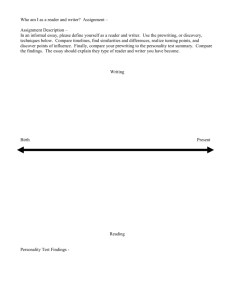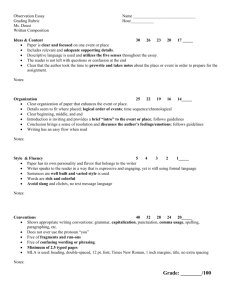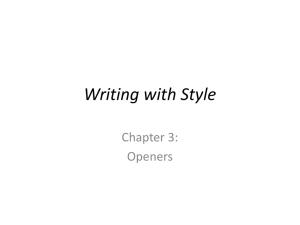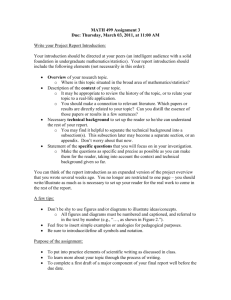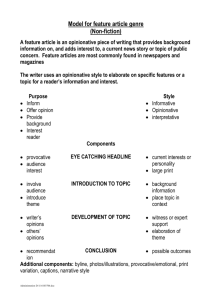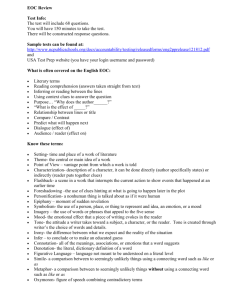Lit vs. Comp - Rhetoric and Composition
advertisement
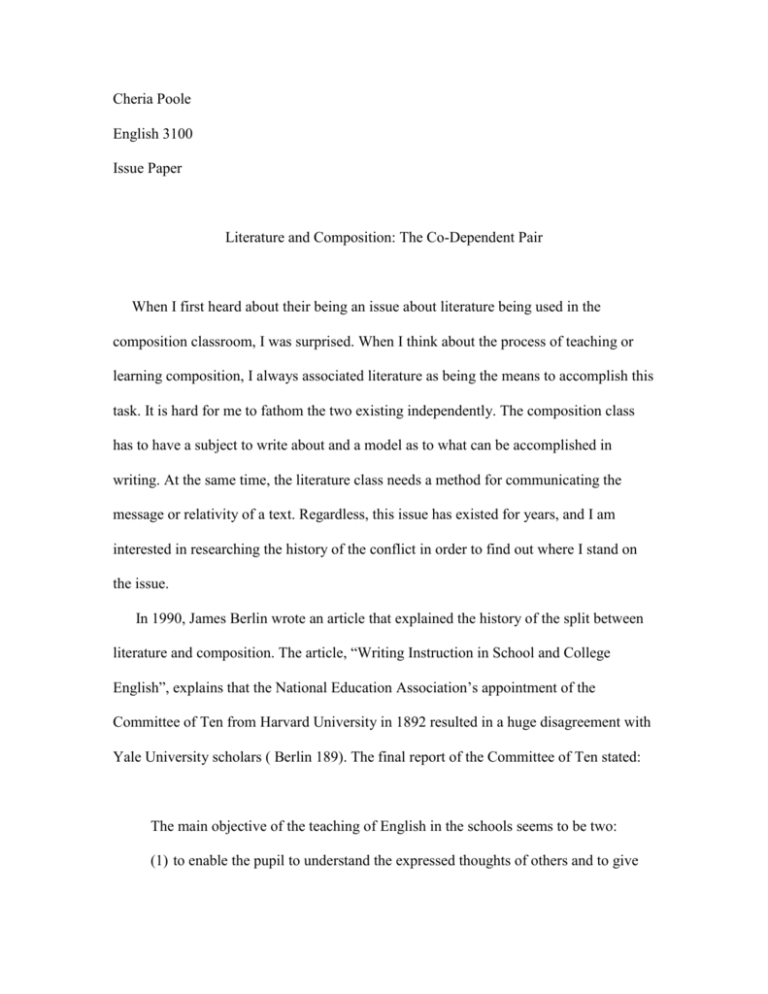
Cheria Poole English 3100 Issue Paper Literature and Composition: The Co-Dependent Pair When I first heard about their being an issue about literature being used in the composition classroom, I was surprised. When I think about the process of teaching or learning composition, I always associated literature as being the means to accomplish this task. It is hard for me to fathom the two existing independently. The composition class has to have a subject to write about and a model as to what can be accomplished in writing. At the same time, the literature class needs a method for communicating the message or relativity of a text. Regardless, this issue has existed for years, and I am interested in researching the history of the conflict in order to find out where I stand on the issue. In 1990, James Berlin wrote an article that explained the history of the split between literature and composition. The article, “Writing Instruction in School and College English”, explains that the National Education Association’s appointment of the Committee of Ten from Harvard University in 1892 resulted in a huge disagreement with Yale University scholars ( Berlin 189). The final report of the Committee of Ten stated: The main objective of the teaching of English in the schools seems to be two: (1) to enable the pupil to understand the expressed thoughts of others and to give expression to thoughts of his own; and (2) to cultivate a taste for reading, to give the pupil some acquaintance with good literature, and to furnish him with the means of extending that acquaintance (Burrows qtd. by Berlin 189). These findings essentially support the teaching of literature as a means to teach writing. However, the article goes on to explain why Yale scholars disagreed with the Committee of Ten. Yale scholars believed that “literature ought to be taught and studied for its own sake” (Berlin 190). Nearly a hundred years later, the articles written about the subject indicate that the issue of whether literature and composition should be taught together is still alive. To use a familiar example, all of the literature classes I have taken at Georgia State require extensive amounts of writing. It is my belief that one would have to be well versed in composition to succeed in these literature classes. Amy Schneider, an educator in rhetoric and composition, notes in her 1998 article that “Composition teachers usually fall into one of three categories: those whom teach composition without literature, those whom solely teach literature because it is easier to teach, and those whom attempt to combine the two methods” (A14). Schneider also notes that the distinction between literature and composition will have an “intellectual impact” because graduate students teaching composition classes are not familiar with composition (A15). An argument that goes along with Schneider’s criticism of “the split” is made by Gary Tate. Tate is a well-known figure in this debate and asserts in his 1993 article “A Place for Literature in Freshmen Composition” that “taking literature out of the classroom deprives students of valuable words and concepts” (318). Tate believes that the distance between literature and composition now is due to the “Rhetoric Police” in the 1960’s (318). The “Rhetoric Police” are, what he describes, “a band of zealots who not many years hence were to become the dreaded enforcement arm of the CCCC” (317-318). Perhaps the most interesting observation made by Tate deals with the questionable goals of the composition course. He states “I sometimes think that we are close to turning freshmen composition in the ultimate ‘service course’ for the university” (319). On the other hand, there are academicians that believe literature and composition should remain separate. Peshe Kuriloff, an educator of composition, wrote an article in 1991 that personifies literature and composition to explain the divide between them. Kuriloff states “…literature and composition do not define English in the same way. They have different ends, and they seek to achieve them by different means” (4). Even though Kuriloff seems to be a strong proponent of composition as a separate entity, his article does suggest that there is a need for literature and composition to intersect. At the end, Kuriloff even states” Teaching writing from the vantage point of English capitalizes on the instructors familiarity with how texts work” (6). I am a firm believer in literature and composition going hand in hand. I remember learning to write, and the entire process was copying something I was reading. An elementary school teacher could not teach writing to students that cannot read. Since reading and writing are taught together fundamentally, I do not see a purpose in them being separated at higher levels of education. One of my favorite quotes on this subject is by Toni Morrison. In an interview, she was asked if she always wanted to be a writer. She responded that she wanted to be a reader. I understand this to mean that reading different material- literary works like poems, essays, short stories, help one’s growth as a writer. Tate’s article left a strong impression on me. I do believe that composition courses lose “valuable words, valuable concepts” (318) when literature is excluded. I try to step back from the situation and consider that my feelings might be due to the fact I am an English major. However, there seems to be something invaluable in reading a work that changes the way one feels about writing. I have come across many students that hate to write, but do read literary texts that are rather advanced. Maybe their interest in writing would be peaked if they could write a personal response to these books that are reserved for English majors. I became very emotional as I have read authors like Morrison or Faulkner because I realized that are many different ways to convey meaning in writing. This belief propelled me to think about how I would utilize reading and writing in the classroom. In my quest for materials that would connect literature and composition, I found many different resources. There is a book that seems to support my goals. It is entitled Literature for Composition. I read through several different sections in the book, but the most helpful sections in the book were in the first chapter. In the first section “The Writer as Reader”, the instructions explain the importance of interpreting a text and tries to establish a connection between the reader and the writer. An example of this is the passage “A writer writes, sets forth his or her meaning and attempts to guide the reader’s responses” (4). The section goes on to explain what reasonable inferences are and how they can be recorded to start the writing process. The next section, “The Reader as Writer”, attempts to explain to the student how he or she can manifest their ideas into a text that expresses feelings, creates an argument, or explains a topic. There are explanations as to what the different forms of writing are and what they seek to accomplish. Each section in the book is very informative and clear. I believe it would serve as a good textbook for a freshmen English course. Though there is possibly no resolution in sight over whether literature should be included in the composition course, I believe there should be some form of unification between the two. As a teacher, I would like to accomplish both tasks with my studentstheir exposure to different literary texts could expand their ideas and, in turn, progress their writing. Though literature and composition may have different “ends”, their means to the end should intersect. Works Cited Barnett, Sylvan, William Burto, William Cain, etc. Literature for Composition: Essays, Fiction, Poetry, and Drama. Longman Publishers, New York (2003) p. 3-27 Berlin, James “Writing Instruction in School and College English”. A Short History of Writing Instruction: From Ancient Greece to Twentieth-Century America, Hermagoras Press (1990) p. 183-219 Kuriloff, Peshe. “Writing Across the Curriculum and the Future of Freshmen English: A Dialogue Between Literature and Composition”. ADE Bulletin. (1991) p. 1-9 Schneider, Amy. “Bad Blood in the English Department: The Rift Between Composition and Literature” The Chronicle of Higher Education. (Feb 1998) A14-A16 Tate, Gary. “A Place for Literature in Freshmen Composition”. College English. NCTE (1993) p. 317-321
